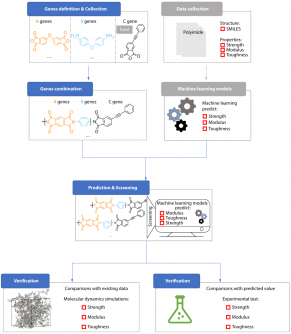URGENT UPDATE: A groundbreaking study released on September 2, 2025, reveals that researchers at the East China University of Science and Technology have developed a revolutionary AI-assisted materials-genome approach that dramatically accelerates the design of ultra-tough polyimide films. This innovative strategy is set to transform industries reliant on high-performance materials, including aerospace and flexible electronics.
Polyimide films are critical for their thermal stability and insulation properties, but achieving a balance between high modulus and toughness has been a persistent challenge. Traditional methods of trial-and-error in material synthesis are not only time-consuming but also costly. The new AI-driven strategy promises to change that by integrating computation, experimentation, and artificial intelligence to rapidly explore complex molecular spaces.
In their study published in the Chinese Journal of Polymer Science, the team introduced a machine-learning model that predicts three essential mechanical properties—Young’s modulus, tensile strength, and elongation at break—across a massive spectrum of candidate structures. This model successfully identified a new formulation, PPI-TB, which outperformed established benchmark polyimides, including PETI-1 and O-O-3.
The research utilized Gaussian process regression (GPR) models trained on over 120 experimental datasets, treating each polymer’s structural fragments as “genes,” thus defining a vast chemical space of 1,720 phenylethynyl-terminated polyimides. The predictive accuracy of the models was impressive, achieving an R² value of approximately 0.70–0.74 for all mechanical metrics.
The molecular dynamics simulations validated these findings, demonstrating that PPI-TB exhibited a remarkable modulus of 3.48 GPa along with superior toughness and strength compared to its predecessors. “By translating polymer fragments into genetic-like descriptors, we can treat molecular design like decoding a genome,” stated Prof. Li-Quan Wang, a lead author of the study. He emphasized that the synergy between data science and chemistry could lead to material innovations that would otherwise take decades to achieve.
This method not only streamlines the design process but also significantly reduces costs and development time, making it a game-changer for creating lightweight, durable, and thermally stable materials essential for next-generation technologies. The implications extend beyond polyimides, with the potential for this workflow to be adapted for other high-performance polymer classes.
As industries look to innovate and improve material performance, this AI-driven materials-genome strategy offers a scalable framework for developing polymers tailored for specific applications. The urgency of these advancements cannot be overstated; as global demand for high-performance materials surges, the ability to quickly design and test new compounds will be vital.
In conclusion, this urgent breakthrough in polymer science is set to redefine the future of materials used in critical sectors. The research not only highlights the incredible potential of combining AI with traditional chemistry but also sets a new standard for how materials can be developed more efficiently and effectively.
Stay tuned for further updates as the implications of this research unfold, and consider sharing this news to spread awareness of an innovation that could change the landscape of materials science forever.







